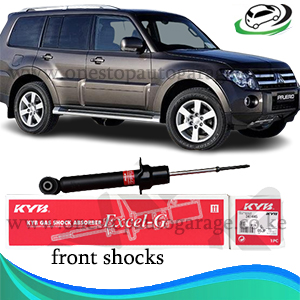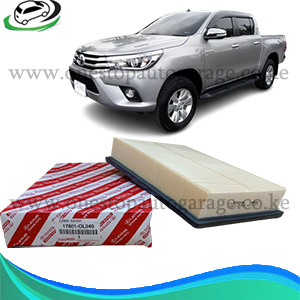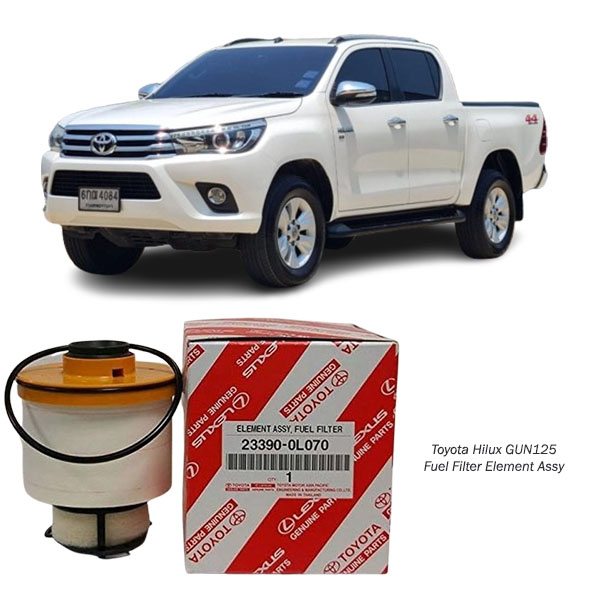-8%
Get Toyota Hilux Vigo 2015+ Fuel Filter Element Assy 23390-0L070 in Kenya
The fuel filter element assembly is a vital component in a vehicle’s fuel system, designed to protect the engine by filtering impurities from the fuel before it reaches critical engine components. Ensuring the delivery of clean fuel is essential for optimal engine performance, longevity, and efficiency.
This comprehensive guide explores the design, function, benefits, maintenance, and replacement of the fuel filter element assembly, providing a deep understanding of its importance in automotive engineering.
What is a Fuel Filter Element Assembly?
The fuel filter element assembly is a self-contained unit typically composed of a filter housing and a replaceable filter element. It is strategically positioned within the fuel delivery system, either between the fuel tank and the fuel pump or between the pump and the fuel injectors.
Key Components of a Fuel Filter Element Assembly:
- Filter Housing
- Protects the filter element and ensures secure installation.
- Filter Element
- Made of specialized materials like pleated paper, synthetic fibers, or metal mesh, this is the core component that captures contaminants.
- Inlet and Outlet Ports
- Allow fuel to enter and exit the filter, ensuring proper flow through the system.
- Seal or Gasket
- Prevents fuel leakage by securing the filter assembly.
- Drain Plug (optional)
- Some fuel filters include a drain plug for removing water or debris without disassembling the unit.
Functions of a Fuel Filter Element Assembly
1. Filtering Impurities
The primary function of the fuel filter is to capture contaminants such as dirt, rust, and debris that can damage the fuel system and engine components.
2. Water Separation
In diesel engines, many fuel filters are designed to separate water from fuel, preventing corrosion and damage to the fuel injectors and pump.
3. Protecting Fuel Injectors
By delivering clean fuel, the filter protects the sensitive nozzles of fuel injectors from clogging, ensuring efficient combustion.
4. Maintaining Fuel Flow
The filter prevents blockages in the fuel lines, ensuring a consistent flow of fuel to the engine.
5. Improving Engine Efficiency
Clean fuel allows for better combustion, leading to improved engine performance, fuel economy, and reduced emissions.
Types of Fuel Filter Element Assemblies
1. Inline Fuel Filters
- Installed in the fuel line, these are common in gasoline engines and are easily replaceable.
2. Cartridge-Style Filters
- Found in both diesel and gasoline engines, the cartridge can be replaced without removing the entire housing.
3. Spin-On Filters
- Popular in older vehicles, these consist of a disposable filter unit that screws onto the housing.
4. Water Separator Filters
- Designed specifically for diesel engines, these filters remove water and impurities simultaneously.
Benefits of a High-Quality Fuel Filter Element Assembly
- Enhanced Engine Longevity
By protecting critical engine components from contaminants, the filter minimizes wear and tear. - Optimized Fuel Efficiency
Clean fuel promotes efficient combustion, leading to better mileage and lower fuel costs. - Reduced Maintenance Costs
Preventing damage to fuel injectors and pumps reduces the likelihood of costly repairs. - Improved Engine Performance
With clean fuel, the engine can operate at peak performance, providing smoother acceleration and consistent power output. - Lower Emissions
Efficient combustion facilitated by clean fuel results in reduced harmful emissions.
Common Signs of a Failing Fuel Filter Element Assembly
1. Engine Misfires or Hesitation
A clogged filter can restrict fuel flow, leading to inconsistent combustion and engine misfires.
2. Reduced Power
Insufficient fuel delivery can cause the engine to struggle, particularly during acceleration or under load.
3. Difficulty Starting the Vehicle
A severely clogged filter may prevent sufficient fuel from reaching the engine, making it hard to start.
4. Poor Fuel Economy
Restricted fuel flow forces the engine to work harder, reducing efficiency and increasing fuel consumption.
5. Fuel System Noise
Unusual noises from the fuel pump may indicate it is working harder to overcome a clogged filter.
Causes of Fuel Filter Element Failure
- Contaminated Fuel
Fuel containing dirt, water, or rust accelerates filter clogging and reduces its lifespan. - Neglecting Maintenance
Failure to replace the filter at recommended intervals can lead to clogging and reduced fuel flow. - Poor-Quality Filters
Using substandard filters may result in inadequate filtration and premature failure. - Fuel System Corrosion
Rust or debris from the fuel tank can accumulate in the filter, causing blockages. - Driving Conditions
Frequent driving on dusty roads or in harsh environments can increase the rate of contamination.
Maintenance and Replacement of Fuel Filter Element Assembly
1. Follow the Manufacturer’s Schedule
Adhere to the replacement interval specified in the vehicle’s owner’s manual, typically every 20,000 to 40,000 kilometers or as recommended.
2. Inspect Fuel Quality
Avoid using contaminated fuel by refueling at reputable stations and checking for signs of water or debris in the fuel.
3. Replace the Filter Promptly
Replace the filter as soon as signs of clogging appear to prevent damage to the fuel system.
4. Choose High-Quality Filters
Invest in OEM or high-quality aftermarket filters to ensure reliable filtration and durability.
5. Check for Water Accumulation
For diesel vehicles, regularly drain water from the filter if it includes a water separator.
Replacing a Fuel Filter Element Assembly
While the replacement process may vary depending on the vehicle, the general procedure involves the following steps:
Tools Needed:
- Wrenches or screwdrivers
- Fuel line disconnect tool (if required)
- Container for catching spilled fuel
Replacement Steps:
- Relieve Fuel System Pressure
Depressurize the fuel system by disconnecting the fuel pump fuse and running the engine until it stalls. - Locate the Filter
Identify the filter’s location, which is usually under the hood, near the fuel tank, or along the frame rail. - Disconnect Fuel Lines
Using the appropriate tools, carefully disconnect the fuel lines from the filter assembly. - Remove the Old Filter
Unbolt or unclip the filter housing and remove the old filter element. - Install the New Filter
Position the new filter element in the housing and secure it according to the manufacturer’s instructions. - Reconnect the Fuel Lines
Attach the fuel lines securely, ensuring no leaks. - Prime the Fuel System
Turn the ignition key to the “ON” position several times without starting the engine to prime the fuel system. - Start the Engine
Check for proper operation and inspect for any fuel leaks.
Conclusion
The fuel filter element assembly is indispensable in safeguarding the engine and fuel system from contaminants, ensuring optimal performance, fuel efficiency, and reliability. Regular maintenance and timely replacement of the filter are essential to prevent costly repairs and prolong the lifespan of the vehicle.
By choosing high-quality filters and following recommended maintenance practices, drivers can enjoy the benefits of a clean and efficient fuel system, contributing to a safer and more enjoyable driving experience.
Follow us on Facebook for more parts.





